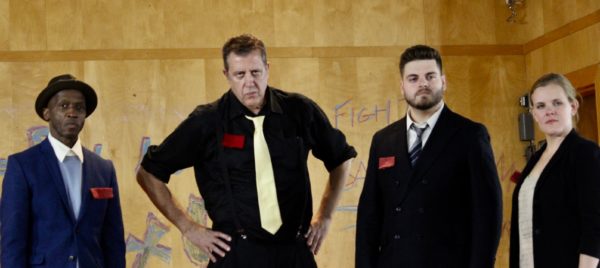Theater Review: Praxis Stage’s “Coriolanus” — Riled-Up Warriors
By David Greenham
The audience members were as diverse as the cast, the show is not being staged in a traditional space in Boston, and the play is incredibly relevant.
Coriolanus by William Shakespeare. Co-directed by Audrey Seraphin and Daniel Boudreau. Staged by Praxis Stage at Dorchester’s Little House, 275 E. Cottage St., Dorchester, MA, through November 3.

Beware the Plebians in the Praxis Stage production of “Coriolanus.” Photo: courtesy of Praxis Stage.
Let it be said that adventurous Praxis Stage isn’t afraid of a challenge. Their current uphill theatrical battle: successfully putting across a bare bones production of Shakespeare’s Coriolanus in the former gym at Dorchester’s Little House. Under the glare of clip lights and surrounded by graffiti covered walls peppered with phrases like “burn Rome,” “Feed the people now,” “Fight back,” and “Rome is hungry,” a large company of actors (most early in their careers) stomp, sneer, and battle their way through the Bard’s late tragedy.
Praxis has chosen a play that reflects these times. Just this week we’ve seen huge protests and marches in Pakistan, Spain, Iraq, Lebanon, Chile, Australia, Canada, and even here in the US. The common people seem to be heeding Coriolanus’ charge to his soldiers at the siege of Corioli: “Now put your shields before your hearts and fight.” Interestingly, the “degenerating world” of the production is set only 30 years in the future and, as the program states, “Things ain’t good.”
This rough-hewn theater production stars an earnest Zair Silva in the title role of the Roman general, supported by Praxis founder Daniel Boudreau’s Menenius Agrippa, Thomika Bridwell’s confident general Titus Lartius, and Stephen Sampson’s gentle Cominius. Caught in the middle are Coriolanus’ family members: his mother Volumnia (Sharon Squires), his wife Virgilia (Ekemini Ekpo), and their son Martius (Kaii Haynes).
The play offers two kinds of debilitating opposition. The internal battlers include the scheming patricians Brutus (Amie Lytle) and Sicinius (Colin McIntire). The savage Volcians provide the ferocious external foes, led by the formidable Tullus Aufidius (Jonah Toussaint). The Praxis production surrounds these combatants with a large ensemble of players, including Karimah Williams, Ben Nissan, Jean Dany Joachim, Vanity Reyes-Carrero, Shari Caplan, Hannah Riffe, Rowen Halpin, Jasper Bliss, and Lauren Squire.
The ensemble charges through the somewhat complicated narrative at a good pace. Despite the swiftly moving scenes and the doubling (and sometimes tripling) of characters, the gist of the story breaks though.
The fight scenes, choreographed by Marge Dunn, are effective and immediate. Given the fact that the small house seats only about 30 patrons on each side of the stage, the fighting can’t help but be mighty exciting — we are up close and personal with actors who are attacking each other with passion.
Less successful is the stylized movement that’s at times incorporated into ensemble’s crowd scenes. Over-stressed marches, isolated movements akin to modern dance, and ineffective thigh slaps and chest thumps detract from what otherwise would be a fairly naturalistic approach to the performances and Shakespeare’s text.
Standouts include Silva’s brooding and serious Coriolanus, the intensity of Toussaint’s Aufidius, and moments of delicately delivered poetry by Squires as Coriolanus’ troubled mother. A particularly shining moment: Thomika Bridwell and Karimah Williams as the memorably mouthy guards at the Volscians camp when Coriolanus arrives.
The raw bones set, which features a ramp on one end and two makeshift structures that serve as ramparts on the other, is intriguing but it isn’t used in very meaningfully dramatic way. Cloth rags have been tied to the structure and across the room; they serve as tattered curtains, which offer the opportunity for easy movement from all directions.
The lighting is also elemental, with ten or twelve clip lights glaring at the stage. The effect isn’t all that different than the glare of fluorescent tubes on a ceiling, though the low angle of the clip lights come off as car lights, as if the space is surrounded by autos momentarily shining on a moment in time.

Fear The Politicians in the Praxis Stage production of “Coriolanus.” Photo: courtesy of Praxis Stage.
There’s more illumination to be found in Rory Lambert-Wright’s sound design, which ebbs and flows throughout the production, neatly reflecting the disjointed nature of the story line and its setting. Likewise, although there is no credit for costumes, the cast has pulled together a rambunctious cacophony of costumes and clothing pieces that are interesting to look at — and effectively indicate who is on which team.
The challenge for this riled-up production is — all-too-often — the densely lyrical text. Like all gym spaces, even the small room at the Little House, the acoustics are downright lousy. Lines end up being shouted, which puts the kibosh on Shakespeare’s poetry and its nuanced meanings. Still, almost everyone has their moments of articulate power. And there are glimmers of the empowering ensemble spirit in this production that seems to be a Praxis Stage speciality.
So it must be admitted that co-directors Audrey Seraphin and Daniel Boudreau fail to find a balance in the raw playing space between serving a plot filled with violence, rhetorical as well as physical, and conveying the concentrated subtlety of language found in the later plays of Shakespeare’s canon. No doubt the challenge was compounded by the fact that Boudreau, the most experienced of the Praxis-teers, cast himself in one of the leading roles.
So is this production unsuccessful? Not at all. There is plenty of extracurricular value here. The audience members were as diverse as the cast, the show is not being staged in a traditional space in Boston, and the play is incredibly relevant. If I still ran a Shakespeare theater, Coriolanus is one of the two plays I’d want to dive into. (The other is the Bard’s horrific dissertation on hate, Titus Andronicus.) [Editor’s Note: never a better time for Timon of Athens.]
So Praxis Stage and Boudreau deserve our applause for venturing into a new place, whipping up a makeshift theater troupe, and refusing to talk down to a contemporary audience. Instead, the company is tackling a thorny yet timely story of a disorientated government under attack, from within and without. Isn’t it time — finally — to hold dear to values in the face of corruption? Or, as the doomed Coriolanus pleads at the play’s end, “Let it be virtuous to be obstinate.”
David Greenham is an adjunct professor of Drama at the University of Maine at Augusta, and is the Associate Director for the Holocaust and Human Rights Center of Maine. He is the current chair of the Maine Arts Commission, and has been a theater artist and arts administrator in Maine for more than 25 years.
